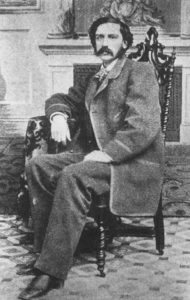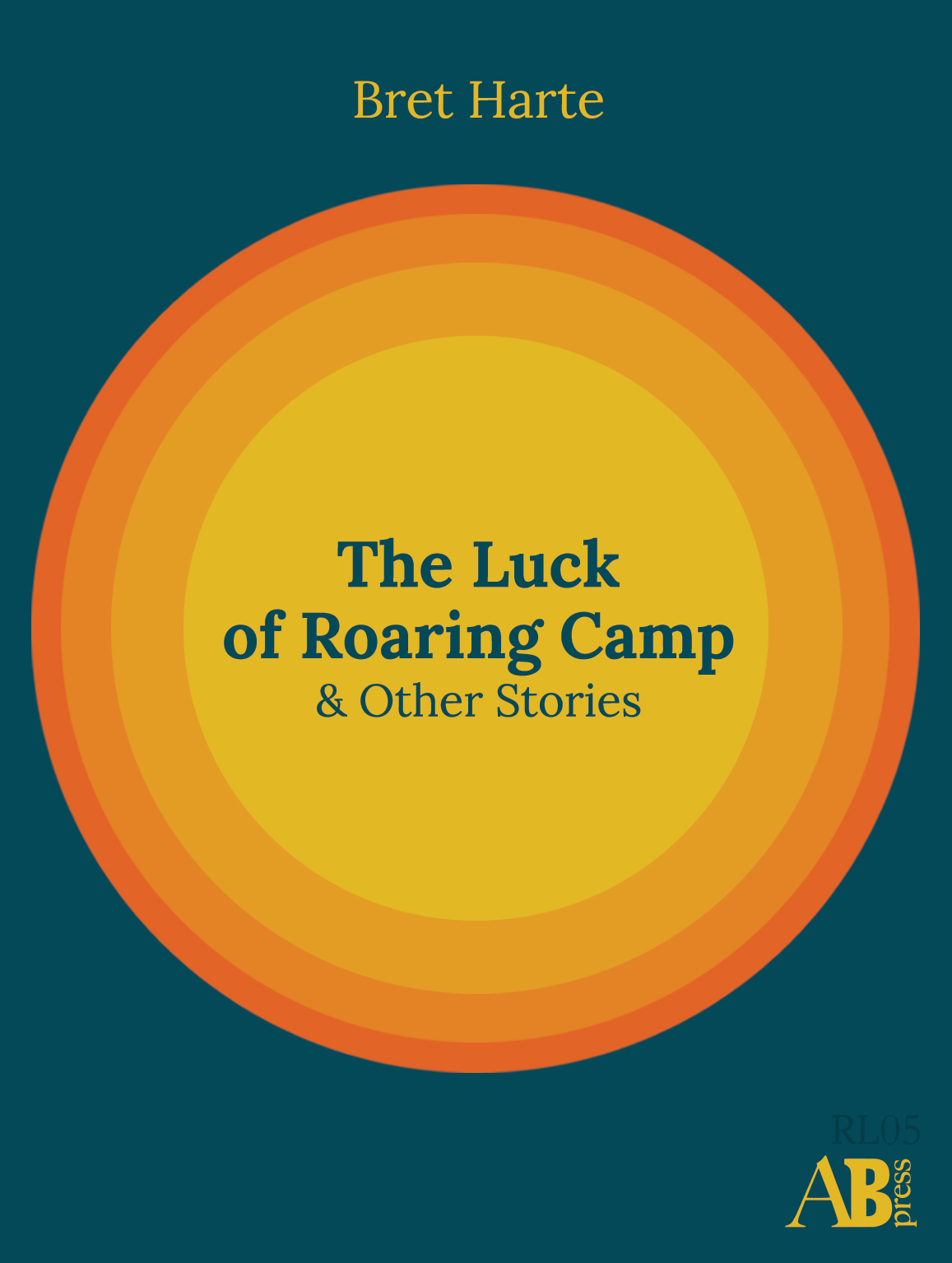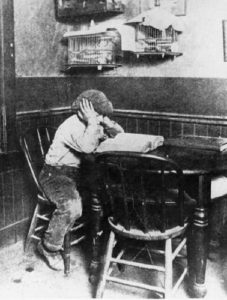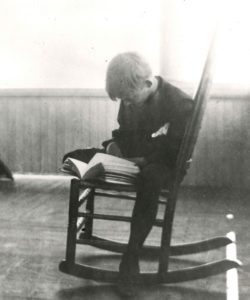Biography
 BRET HARTE (1836-1902) finished his schooling at 13. He was born in Albany, New York, but moved to California in 1854 where he was employed as a teacher, miner, messenger and journalist. His life reads as improbable as any other well read, intelligent. ambitious man at that time, but one constant was his ability to make enemies, perhaps unwisely but it would seem rarely without consideration. When 24, as a temporary acting editor of The Northern Californian, he reported in caustic tone of a massacre of Wiyot Indians: “a more shocking and revolting spectacle never was exhibited to the eyes of a Christian and civilized people. Old women wrinkled and decrepit lay weltering in blood, their brains dashed out and dabbled with their long grey hair. Infants scarcely a span long, with their faces cloven with hatchets and their bodies ghastly with wounds.” He was forced to move away from the area after he received death threats, but even when settled in San Francisco he was to publish an anonymous letter of condemnation. When commissioned to edit an anthology of Californian poetry in 1865, the finished volume contained only 19 poems. Harte cited the state’s “monotonous climate” as the reason for its bad poetry; he attracted much derision locally, although the observation was well received elsewhere.
BRET HARTE (1836-1902) finished his schooling at 13. He was born in Albany, New York, but moved to California in 1854 where he was employed as a teacher, miner, messenger and journalist. His life reads as improbable as any other well read, intelligent. ambitious man at that time, but one constant was his ability to make enemies, perhaps unwisely but it would seem rarely without consideration. When 24, as a temporary acting editor of The Northern Californian, he reported in caustic tone of a massacre of Wiyot Indians: “a more shocking and revolting spectacle never was exhibited to the eyes of a Christian and civilized people. Old women wrinkled and decrepit lay weltering in blood, their brains dashed out and dabbled with their long grey hair. Infants scarcely a span long, with their faces cloven with hatchets and their bodies ghastly with wounds.” He was forced to move away from the area after he received death threats, but even when settled in San Francisco he was to publish an anonymous letter of condemnation. When commissioned to edit an anthology of Californian poetry in 1865, the finished volume contained only 19 poems. Harte cited the state’s “monotonous climate” as the reason for its bad poetry; he attracted much derision locally, although the observation was well received elsewhere.
In 1868, as editor of The Overland Monthly, a new literary magazine, he published his short story The Luck of Roaring Camp, which shot him to nationwide fame; it was published in a first and very well received volume of short stories in 1870. A satirical (and, at the time, misinterpreted) poem, Plain Language from Truthful James (colloquially known as The Heathen Chinee), added further notoriety. Harte, chasing the dollar and a more solid literary life, moved back with great applause to the East, to New York in 1871, later to Boston; Mark Twain observed wryly that he “crossed the continent through such a prodigious blaze of national interest and excitement that one might have supposed he was the Viceroy of India … or Halley’s Comet…” (Twain and Harte were great friends initially and had collaborated on a play; Twain regarded Harte as his mentor. But they fell out rather dramatically, Twain then to observe that “Harte is a liar, a thief, a swindler, a snob, a sot, a sponge, a coward, a Jeremy Diddler, he is brim full of treachery…”) Harte negotiated a substantial annual fee from the publisher (Fields, Osgood & Co.) of The Atlantic Monthly, an unprecedented sum of $10,000 for 12 stories. His good fortune did not hold, Harte became depressed, stalled on his writing as its quality declined, his career slumped and he struggled for work; between 1873 and 1876 he managed to publish only seven short stories; he found himself in debt.
Harte moved to Europe in 1878, first as a United States Consul in Germany, then in Glasgow (“To send this nasty creature to puke upon the American name in a foreign land is too much,” lamented Twain); in 1885 he settled in London. He spent 24 years in Europe, writing prodigiously and successfully though not lauded as before. His European sojourn became permanent but his time there was spent alone. He sent money home but was never reunited with his wife and children; one early biographer had suggested that Harte’s wife was “almost impossible to live with.” Bret Harte died in London in 1902.
However far he strayed in subject matter, he was always known for, and frequently returned to, telling stories of the Californian Gold Rush. He monetised the Wild West and made it palatable to the rest of America. He was a literary John the Baptist who prepared the way for the less genteel genre of the Western, John Wayne and Bonanza. Included here are seven of his best tales.
CONTENTS
The Luck of Roaring Camp
The Outcasts of Poker Flat
Tennessee’s Partner
The Idyl of Bed Gulch
Brown of Calaveras
The Iliad of Sandy Bar
The Poet of Sierra Flat





 Allen Lane, the founder of Penguin books, was a man who liked to be seen riding a virtuous horse though his spurs were as sharp as an abacus: money was his game and he chanced to sell his new Penguin range through his Penguincubator in 1937, in tobacconists alongside newspapers and boiled sweets, also a few placed as concessions in branches of F. W. Woolworth’s. One Penguincubator was commissioned at Charing Cross Station, placed next to a machine vending cigarettes. (6d the price of a packet of fags, 6d the price of the first Penguins, though am not sure if Lane had thought through how you were supposed to keep the books alight without a filter.) Booksellers in the Charing Cross locality objected to the Penguincubator and it was removed. It would seem that they were never successful in any case.
Allen Lane, the founder of Penguin books, was a man who liked to be seen riding a virtuous horse though his spurs were as sharp as an abacus: money was his game and he chanced to sell his new Penguin range through his Penguincubator in 1937, in tobacconists alongside newspapers and boiled sweets, also a few placed as concessions in branches of F. W. Woolworth’s. One Penguincubator was commissioned at Charing Cross Station, placed next to a machine vending cigarettes. (6d the price of a packet of fags, 6d the price of the first Penguins, though am not sure if Lane had thought through how you were supposed to keep the books alight without a filter.) Booksellers in the Charing Cross locality objected to the Penguincubator and it was removed. It would seem that they were never successful in any case.